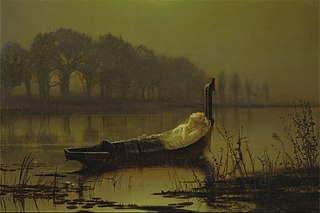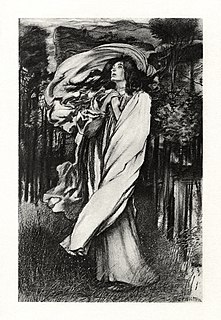Related Research Articles
Agnosticism is the view that the existence of God, the divine, or the supernatural is not certainly known. If the question is "Does God exist?", yes would imply theism, no would imply atheism, and "I'm not sure" would imply agnosticism—that God possibly can or cannot exist. Another definition provided is the view that "human reason is incapable of providing sufficient rational grounds to justify either the belief that God exists or the belief that God does not exist."

Monism attributes oneness or singleness to a concept e.g., existence. Various kinds of monism can be distinguished:
Pantheism is the belief that reality is identical with divinity, or that all-things compose an all-encompassing, immanent god. Pantheist belief does not recognize a distinct personal god, anthropomorphic or otherwise, but instead characterizes a broad range of doctrines differing in forms of relationships between reality and divinity. Pantheistic concepts date back thousands of years, and pantheistic elements have been identified in various religious traditions. The term pantheism was coined by mathematician Joseph Raphson in 1697 and has since been used to describe the beliefs of a variety of people and organizations.

Theism is broadly defined as the belief in the existence of a supreme being or deities. In common parlance, or when contrasted with deism, the term often describes the classical conception of God that is found in monotheism – or gods found in polytheistic religions—a belief in God or in gods without the rejection of revelation as is characteristic of deism.

Alfred Tennyson, 1st Baron Tennyson was a British poet. He was the Poet Laureate during much of Queen Victoria's reign and remains one of the most popular British poets. In 1829, Tennyson was awarded the Chancellor's Gold Medal at Cambridge for one of his first pieces, "Timbuktu". He published his first solo collection of poems, Poems Chiefly Lyrical in 1830. "Claribel" and "Mariana", which remain some of Tennyson's most celebrated poems, were included in this volume. Although decried by some critics as overly sentimental, his verse soon proved popular and brought Tennyson to the attention of well-known writers of the day, including Samuel Taylor Coleridge. Tennyson's early poetry, with its medievalism and powerful visual imagery, was a major influence on the Pre-Raphaelite Brotherhood.

In theology, the doctrine of divine simplicity says that God is without parts. The general idea can be stated in this way: The being of God is identical to the "attributes" of God. Characteristics such as omnipresence, goodness, truth, eternity, etc., are identical to God's being, not qualities that make up that being, nor abstract entities inhering in God as in a substance; in other words we can say that in God both essence and existence are one and the same.

"Ulysses" is a poem in blank verse by the Victorian poet Alfred, Lord Tennyson (1809–1892), written in 1833 and published in 1842 in his well-received second volume of poetry. An oft-quoted poem, it is a popular example of the dramatic monologue. Facing old age, mythical hero Ulysses describes his discontent and restlessness upon returning to his kingdom, Ithaca, after his far-ranging travels. Despite his reunion with his wife Penelope and his son Telemachus, Ulysses yearns to explore again.
Nontheism or non-theism is a range of both religious and nonreligious attitudes characterized by the absence of espoused belief in a God or gods. Nontheism has generally been used to describe apathy or silence towards the subject of God and differs from atheism. Nontheism does not necessarily describe atheism or disbelief in God; it has been used as an umbrella term for summarizing various distinct and even mutually exclusive positions, such as agnosticism, ignosticism, ietsism, skepticism, pantheism, atheism, strong or positive atheism, implicit atheism, and apatheism. It is in use in the fields of Christian apologetics and general liberal theology.
The existence of God is a subject of debate in the philosophy of religion and popular culture. A wide variety of arguments for and against the existence of God can be categorized as metaphysical, logical, empirical, subjective or scientific. In philosophical terms, the question of the existence of God involves the disciplines of epistemology and ontology and the theory of value.

"The Lady of Shalott" is a lyrical ballad by the English poet Alfred Tennyson. Inspired by the 13th-century short prose text Donna di Scalotta, it tells the tragic story of Elaine of Astolat, a young noblewoman stranded in a tower up the river from Camelot. One of the poet's best-known works, its vivid medieval romanticism and enigmatic symbolism inspired many painters, especially the Pre-Raphaelites and their followers, and other artists and authors.

"In Memoriam A.H.H." is a poem by the British poet Alfred, Lord Tennyson, published in 1850. It is a requiem for the poet's beloved Cambridge friend Arthur Henry Hallam, who died suddenly of a cerebral haemorrhage in Vienna in 1833, aged 22. It contains some of Tennyson's most accomplished lyrical work, and is an unusually sustained exercise in lyric verse. It is widely considered to be one of the greatest poems of the 19th century.

In monotheistic thought, God is conceived of as the supreme being, creator, and principal object of faith. God is usually conceived of as being omnipotent, omniscient, omnipresent and omnibenevolent as well as having an eternal and necessary existence. God is most often held to be incorporeal, with said characteristic being related to conceptions of transcendence or immanence.

Anacalypsis is a lengthy two-volume treatise written by religious historian Godfrey Higgins, and published after his death in 1836. The book was published in two quarto volumes numbering 1,436 pages, and contains meticulous references to hundreds of references. Initially printed as a limited edition of 200 copies, it was partially reprinted in 1878, and completely reprinted in a limited edition of 350 copies in 1927. In 1965, University Books, Inc. published 500 sets for the United States and 500 sets for the British Commonwealth with Publisher's Note and a Postface.

The Lady of Shalott is a painting of 1888 by the English painter John William Waterhouse. It is a representation of the ending of Alfred, Lord Tennyson's 1832 poem of the same name. Waterhouse painted three versions of this character, in 1888, 1894 and 1915. It is one of his most famous works, which adopted much of the style of the Pre-Raphaelite Brotherhood, though Waterhouse was painting several decades after the Brotherhood split up during his early childhood. The Lady of Shalott was donated to the public by Sir Henry Tate in 1894 and is usually on display in Tate Britain, London, in room 1840.

"Tithonus" is a poem by the Victorian poet Alfred, Lord Tennyson (1809–92), originally written in 1833 as "Tithon" and completed in 1859. It first appeared in the February edition of the Cornhill Magazine in 1860. Faced with old age, Tithonus, weary of his immortality, yearns for death. The poem is a dramatic monologue with Tithonus addressing his consort Eos, the goddess of the dawn.

"Oenone" or "Œnone" is a poem written by Alfred Tennyson in 1829. The poem describes the Greek mythological character Oenone and her witnessing incidents in the life of her lover, Paris, as he is involved in the events of the Trojan War. "Oenone" was inspired by Tennyson's trip to Spain, where he visited the Pyrenees mountains. It is considered the simplest of Tennyson's dramatic monologues.

Pandeism, a theological doctrine first delineated in the 18th century, combines aspects of pantheism with aspects of deism. It holds that a creator deity became the universe and ceased to exist as a separate and conscious entity. Pandeism is proposed to explain why God would create a universe and then appear to abandon it, and an origin and purpose of the universe.

Max Bernhard Weinstein was a German physicist and philosopher. He is best known as an opponent of Albert Einstein's Theory of Relativity, and for having written a broad examination of various theological theories, including extensive discussion of pandeism.
The belief that God became the Universe is a theological doctrine that has been developed several times historically, and holds that the creator of the universe actually became the universe. Historically, for versions of this theory where God has ceased to exist or to act as a separate and conscious entity, some have used the term pandeism, which combines aspects of pantheism and deism, to refer to such a theology. A similar concept is panentheism, which has the creator become the universe only in part, but remain in some other part transcendent to it, as well. Hindu texts like the Mandukya Upanishad speak of the undivided one which became the universe.
References
- ↑ C. D. Broad, Review of Brown's The metaphysical society (1947), p. 101.
- ↑ D. T. Starnes, "The Influence of Carlyle Upon Tennyson, The Texas Review, Volumes VI, No. 4 (July 1921), p. 323.
- 1 2 Robert Forman Horton, Alfred Tennyson: A Saintly Life, 1900, p. 197.
- ↑ Gene Edward Veith; Douglas Wilson & G. Tyler Fischer (2009). Omnibus IV: The Ancient World. p. 49. ISBN 978-1932168860.
Alfred Tennyson left the faith in which he was raised and near the end of his life said that his 'religious beliefs also defied convention, '. leaning towards agnosticism and pandeism.'
- ↑ Malcolm Johnson (2014). Victorian Worthies: Vanity Fair's Leaders of Church and State. p. 72. ISBN 978-0232531572.
- ↑ https://rpo.library.utoronto.ca/content/higher-pantheism-nutshell
| Wikisource has original text related to this article: |